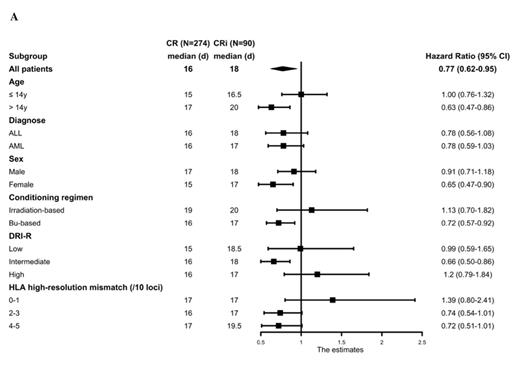Recent studies have shown that measurable residual disease (MRD) has a definite impact on transplantation outcomes for acute leukaemia patients. However, the influence of complete remission with incomplete count recovery (CRi) prior to transplantation is rarely reported. Therefore, we retrospectively analysed 364 MRD-negative acute leukaemia patients who received single-unit unrelated cord blood transplantation (sUCBT). Among them, 90 patients were diagnosed with CRi. The cumulative incidence of neutrophil engraftment was lower for the CRi patients than for the CR patients. The cumulative incidences of platelet engraftment, 100-d non-relapse mortality (NRM), acute graft-versus-host disease(GVHD), chronic GVHD and the probabilities of 5-year overall survival, leukaemia-free survival and GVHD-free relapse-free survival were comparable. Among the patients older than 14 years (≥ 14), the CRi group was associated with decreased neutrophil and platelet engraftment compared to the CR patients (92.0% vs. 96.8%, 58.0% vs. 76.0%, P = 0.019, 0.018, respectively). Multivariate analysis of neutrophil engraftment in the patients ≥ 14 revealed that CRi,especially incomplete platelet recovery (CRp) prior to transplantation, were independent risk factors. Our study suggests that CRi is associated with an increased risk of graft failure for patients ≥ 14 after sUCBT, even after controlling for other risk factors.
Disclosures
No relevant conflicts of interest to declare.


This feature is available to Subscribers Only
Sign In or Create an Account Close Modal